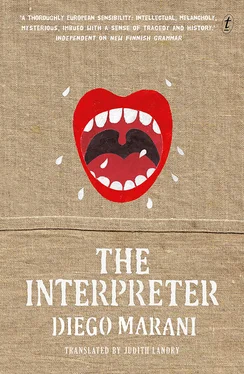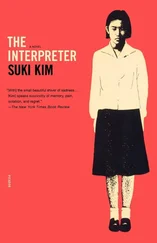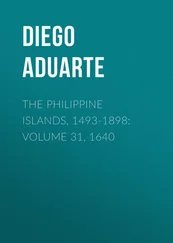‘I have your name from Janos,’ I said as quietly as I could, hoping the others wouldn’t hear. Radu nodded and pulled me roughly to one side.
‘It’s five hundred for the journey, and a thousand for the documents,’ he said quietly, looking me up and down with his small, bright eyes and counting out the banknotes suspiciously with elegant flicks of his fingertips. Then he produced a package from his pocket — it was wrapped in newspaper and bound with an elastic band — he opened it and drew out a pristine new passport, which he handed me furtively. Shielding it with my coat, I peered at the green document which informed me, by the glancing light of the bonfire, that my name was now Tibor Preda and that I had been born at Galati on 30th November 1952. The photo on the first page was one that Janos had taken of me in front of the wall of a warehouse at the timber wharf. Radu was showing signs of impatience; he zipped up the inner pocket of his sheepskin coat and gabbled something I couldn’t understand, pointing me in the direction of the third lorry, which was puttering away and emitting a considerable amount of smoke, its back wheels stuck in the mud. Keeping my eye on him, I went up to it, opened the door and climbed in; he stood there, still rubbing his hands, breathing on them for warmth; then at last he walked off towards the lorry in which he had come. I found myself sitting next to the man in the rubber boots, who was settling into his seat and wrapping himself up in a blanket.
‘Now you can have a good sleep, and when you wake up we’ll be in Warsaw, just in time for coffee!’ he exclaimed, drumming his fingers on the face of his watch, then nudging the driver who was seated to his other side. The man responded by drawing deeply on his cigarette; then, with a yawn accompanied by a sleepy chortle, he sank his foot down on the accelerator; the engine gave out a loud clanging sound and the vehicle became wreathed in dense white smoke. Then the whole column moved off through a scattering of dismal empty blocks of flats, the lights of a goods yard revealing uncurtained windows and empty rooms littered with debris. After a long detour around the city we took the trunk road going north; my travelling companion must have been used to such conditions, because despite the constant juddering and jolting, wrapped in his blanket he soon fell asleep. The driver chain-smoked but didn’t utter a word; he drove with his forearms resting on the wheel; the cab was draughty, but the chill was lessened by a warm blast of stinking diesel coming from an impeller below the dashboard. I too wrapped myself in a blanket I’d found on my seat, and huddled up against the door. It wasn’t long before we were at the Moldavian frontier; it was five o’clock in the afternoon, but it seemed like the dead of night; the countryside was wreathed in a heavy layer of cloud. Through the mud-splattered window I glimpsed Radu at the barrier, chatting with a soldier wearing a large fur busby; they were laughing and gesticulating, giving one another hearty slaps on the back, their breath white in the light of the sentry box. The soldier leafed distractedly through the bundle of passports while the Romanian walked up and down in front of the barrier; then he nodded to the driver of the first lorry, who climbed down from his vehicle and went to deposit a crate in the boot of a car parked behind the customs shed. The soldier gave a salute and went back into his sentry box, and the barrier went up in front of the lorries. We drove on through a dark plain, past the corrugated roofs of the occasional village which loomed up before our headlights like a vision and disappeared again instantly, swallowed up in the glare of the snow. In the light of a solitary street-lamp I glimpsed shadows walking along the edge of the road, pulling sledges laden with sacks; in the distance I made out the outline of a train, stationary and alone in the empty countryside. After a long stretch during which I saw nothing but the tail-lights of the lorry in front of us, we reached the outskirts of a town; we crossed an iron bridge, on the other side of which I saw the outline of houses, shrouded in shadow. The road became narrower, running between buildings whose windows were plastered with advertisements, between crumbling walls and heaps of snow, past a large factory with lifeless chimneys; our headlights picked out packs of dogs which would scatter, barking, as we passed. When the houses began to thin out, we found ourselves in a large open space dotted with puddles and lit by the large neon signs of a petrol station; the lorries formed a slow-moving queue in front of the single pump, while the drivers banded into groups to smoke, hopping about in their efforts to keep warm. We set off again along a road which soon became steep and, at times, winding; the vegetation became denser, and soon we found ourselves in a wood. We drove on for several more hours, and it’s possible that I may have fallen asleep, between one jolt and another. I don’t remember what time it was when the column drew up in a clearing in the middle of a wood; the headlights were turned off, and as soon as my eyes became accustomed to the darkness I could dimly make out the outlines of my companions as they climbed down from the lorries; my driver took his jacket from the hook, shook the man with the rubber boots and jumped down from the cab, leaving the door half-open. The air was intensely cold; a thick mist was swirling among the trees. Stiff and befuddled, I took a few steps to stretch my legs, then joined a small group of other travellers who were shuffling around in the snow, smoking and chatting in low voices. Some had gone off among the trees to urinate, others were producing iron rations and handing round a steaming thermos flask. It was by pure chance that I noticed the black car parked on the other side of the road, its lights out but its engine still running; a slight plume of purple smoke was emerging from the exhaust pipe, and I could hear the slow beat of the pistons; inside, I could see the glowing tips of cigarettes. I was staring at it curiously when the man in rubber boots came up to offer me a mug of tea and a piece of bread imbued with just the faintest whiff of bacon; I thanked him and took an eager gulp of the hot, sweet, cinnamon-flavoured liquid. We stood beside each other, chewing in silence, under the pitch-black, ice-encrusted trees. A sudden call rang out through the darkness and the lorries’ engines were turned on again. Dim shapes came forwards through the snow and disappeared slowly behind the doors, which then banged shut. I too set off towards our lorry, following the man in the rubber boots, when I felt myself grabbed by the shoulders and forcibly dragged off; I tried to shout, to struggle free, but a sharp blow winded me. The black car on the other side of the road started up its engine and skidded across the snow towards me; the door opened, and the man holding me by the shoulders thrust me into it; clutching me to him, he gave me a sharp punch in the stomach, stunning me and causing me to fall forwards, but firm hands slipped under my arms and pulled me onto the seat. I could feel someone rolling up my sleeve, could feel something cold slipping into a vein. I was dimly aware of the red tail-lights of the lorries as they drove off along the road; after that, nothing.
It was the shooting pain in my wrist that woke me. I raised my head and saw my swollen hand shackled to the bedhead; using my feet for leverage, I managed to roll over on one side. I noticed that I was wearing nothing but a rough cotton gown that did up down the back; my legs were covered with an army blanket. The room was overheated, and a bitter smell of bleach mingled with musty plaster hung in the air; daylight was filtering in through frosted glass. Twisting my wrist painfully in the handcuff, at last I managed to sit up. Decrepit and filthy though it was, the place was clearly some sort of hospital. One corner of the room was strewn with shards of glass; there was a washbasin against one wall, and a little medicine cabinet on another with rows of small glass bottles. Piled up by a small fridge were several large plastic containers and a few packs of dry ice; a neon tube was flickering above a mirror near the door, sometimes almost fizzling out entirely, then springing back into life and sending out flashes of greenish glare. The middle of the room was occupied by an ancient, peeling operating table, with two tin buckets and a couple of rags positioned beneath the holes in its steel base; a circular lamp hung from the ceiling, which was covered in blackish mould following the outline of the beams. The bed to which I was handcuffed was near the window; a fur coat hung from a hook in the wall. Somewhere outside, I could hear an engine turning over; then I heard steps approaching. I lay down again hurriedly and hid my face under the blanket; I could now hear voices, as well as steps. Then the door opened slowly, and a shadowy figure shouldered his way in, his hand on the doorhandle — a tall, bald man wearing a surgeon’s gown, which he took off to put on the fur coat hanging from the hook. He was talking quietly to someone I couldn’t see. He crept up to the bed; I closed my eyes, pretending I was still unconscious. I could feel him taking my pulse, listening to my heartbeat. He bent over me and raised one of my eyelids, then drew back, addressing some remark to his companion, who interrupted him impatiently. They were talking Romanian, but I couldn’t understand what they were saying. They argued briefly, then the other man seemed to give way. The door closed again; I heard steps going down the stairs, then the sound of an engine starting up and a car driving off. Then silence fell again, broken only by the clicking of the stove; yet I sensed that one of the two was still in the room. Half-opening my eyes, I recognised Radu’s fur cap; he was sitting on a stool and leafing through a bundle of banknotes, moistening his thumb with his tongue from time to time. He had taken off his jacket and hung it from the hook, on top of the surgeon’s gown. He took his revolver out of his pocket and slipped it inside his cap, which he then placed on the floor. I moved very slightly, and he jumped. He raised his eyes to check that the handcuffs were still in place, then carried on with his counting; a phone buzzed in his pocket and he pulled out a large mobile, hiding his mouth behind his collar as he spoke.
Читать дальше












